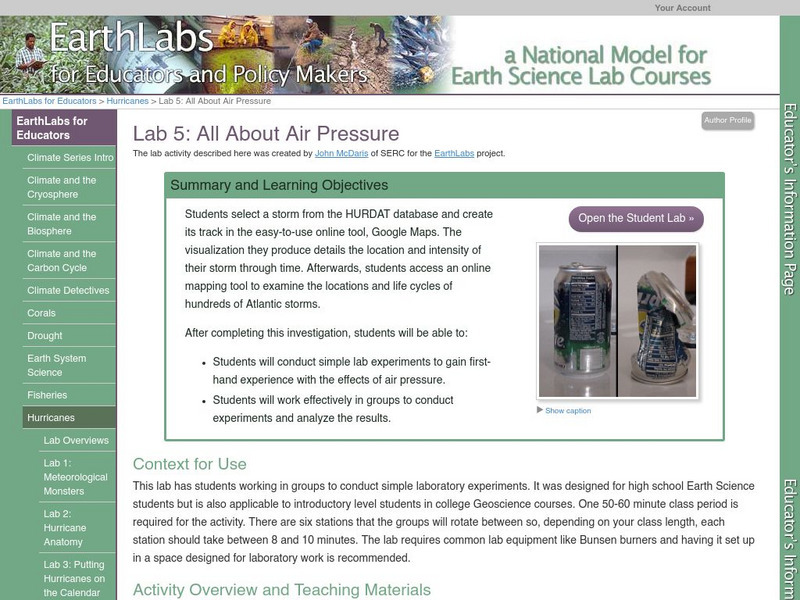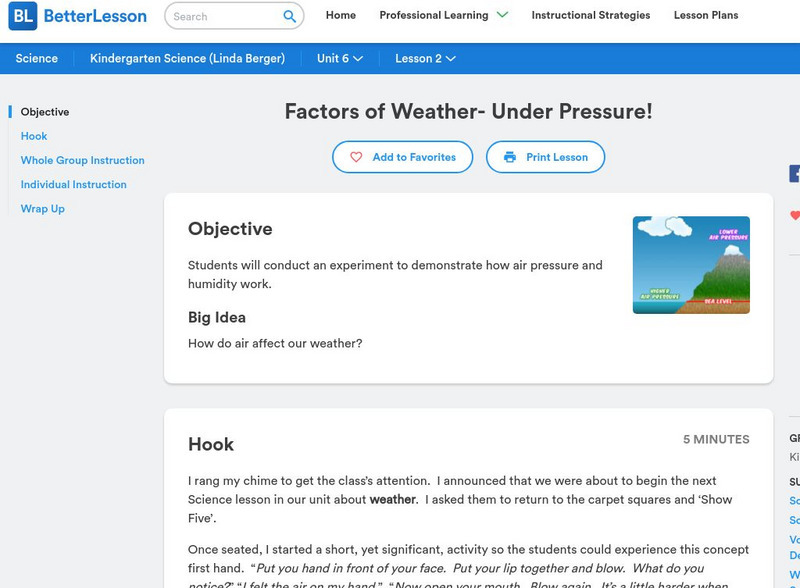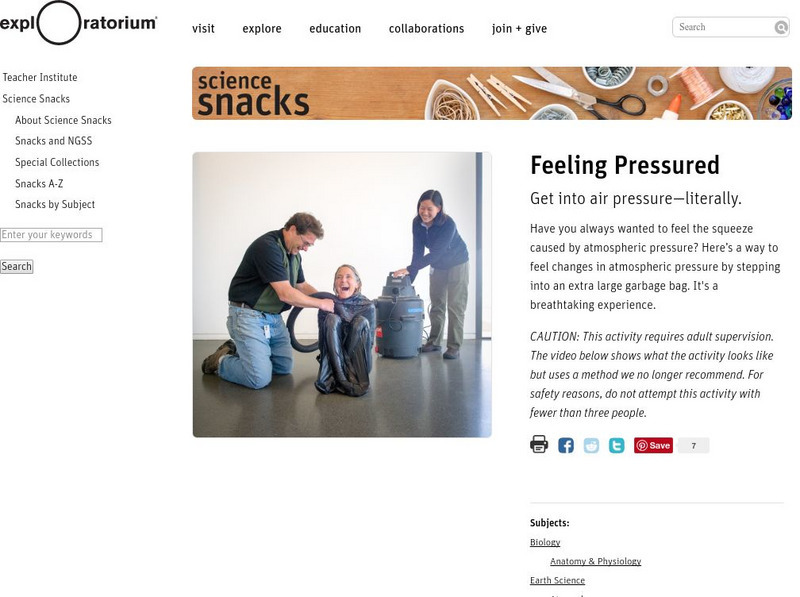Curated OER
Is it Partly Cloudy or Partly Sunny?
Students investigate the concept of weather and how it is created. They review relevant vocabulary related to weather. Students predict weather given slight background knowledge. The lesson includes background information for the...
Curated OER
Look Mom, No Wings!
Students explain how drag, weight, lift and thrust work together to make something fly. In this physics lesson, students measure their jump height and record data on the table. They reason out why they can't remain airborne for long.
Curated OER
Hurricanes 2: Tracking Hurricanes
Students examine the role of technology in identifying and tracking hurricanes.
Curated OER
Wind
Learners build an anemometer and measure wind speed. In this wind speed instructional activity, students build an anemometer using the student instruction sheet. Learners visit the Alaska windspeed website and look up the wind speed...
Curated OER
Airplane Propeller
Students examine the different kinds of propellers and their functions. In this airplane lesson students build a hand made propeller.
Curated OER
Is It There?
Students participate in a instructional activity designed to illustrate these concepts using simple materials. They use Science process skills to observe, measure, predict, make inferences, and communicate while completing the activity....
Curated OER
Robert Boyle and Experimental Methods
Pupils discuss the difference between the Baconian inductive method and the Aristotelian deductive approaches. They complete a given set of questions then discuss them with the class.
Curated OER
Pop Rockets
Students work together to design and build a paper rocket. They place a propellant in the contraption to make it fly. They discover Newton's third law of motion.
Curated OER
Sentence Completion
In this grammar learning exercise, students finish ten sets of unfinished sentences by joining them together with a variety of -ing expressions.
Curated OER
Science Quizzes: Weather Quiz
In this weather science quiz worksheet, students respond to 20 short answer and true or false questions regarding weather and extreme weather.
Curated OER
Aerodynamic drag
Students construct a device that can launch spinning balls. One example would be a mailing tube with one side partially cut away, lined with sandpaper. Styrofoam balls should be used for the greatest effet. They are explained how a...
Science Education Resource Center at Carleton College
Serc: Lab 5: All About Air Pressure
A lab experiment in a series of experiments that explores hurricanes. Students learn about the effects of the differences in air pressure with hand-on experiments and demonstrations
Other
Federal Aviation Administration: Air Takes Up Room [Pdf]
See how air takes up space by conducting this classroom experiment. With the aid of several common objects, observe the effects of air pressure.
Better Lesson
Better Lesson: Factors of Weather Under Pressure
How does air affect our weather? Students will conduct an experiment to demonstrate how air pressure and humidity work. Included are pictures and videos of the lesson in action, whole group and individualized instruction plans, and a...
PBS
Pbs Kids: Science Rocks: Air Lift
Through this experiment, students are challenged to lift a book (and other items) with just air. Requires simple household items, gallon-size, zipper-lock plastic bag, book, pencil, drinking straw, and tape.
Education.com
Education.com: An Air Science Experiment
[Free Registration/Login Required] With three simple items (ball of paper, 2 liter pop bottle & hair dryer) you can demonstrate the reality of air pressure. This experiment is user friendly.
Scholastic
Scholastic: Dirtmeister's Science Lab: The Air Is There
An experiment to see how the temperature of an object affects how high it bounces. This site contains web links and notes for the teacher.
NASA
Nasa: How Air Pressure Affects You
This site from NASA offers a general overview of air pressure. Explores the concept through experiments and interactive games, as well as discussion questions.
Exploratorium
Exploratorium: Science Snacks: Feeling Pressured
Feel the effects of air pressure in this activity! Activity will have students feeling a squeezing sensation as the difference in air pressure causes the air to rush from high to low pressure.
University Corporation for Atmospheric Research
Ucar: Clouds in the Air: Why Are They There?
An experiment that demonstrates why there are clouds in the sky. Start with air, invisible water vapor, particles we call condensation nuclei, and air pressure...the cloud comes later!
American Chemical Society
American Chemical Society: Best of Wonder Science: There's Air in There! [Pdf]
An experiment to obsevre the effects of air pressure on the water level inside a bottle.
PBS
Pbs Teachers: Balloon & Straw Experiment
Investigate air pressure, motion and the forces of air currents using a bendy straw, a balloon and a rubber band.
PBS
Pbs Teachers: Card Lift Experiment
Demonstrate air pressure by using index cards to defy gravity.
TeachEngineering
Teach Engineering: I Can't Take the Pressure!
Students develop an understanding of air pressure by using candy or cookie wafers to model how it changes with altitude, by comparing its magnitude to gravitational force per unit area, and by observing its magnitude with an aluminum can...













![Federal Aviation Administration: Air Takes Up Room [Pdf] Activity Federal Aviation Administration: Air Takes Up Room [Pdf] Activity](https://d15y2dacu3jp90.cloudfront.net/images/attachment_defaults/resource/large/FPO-knovation.png)







